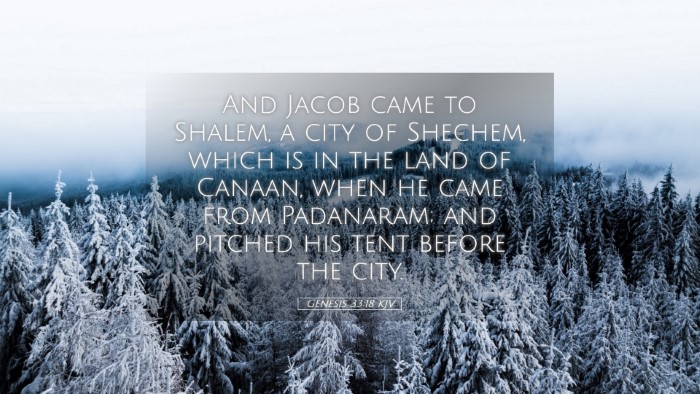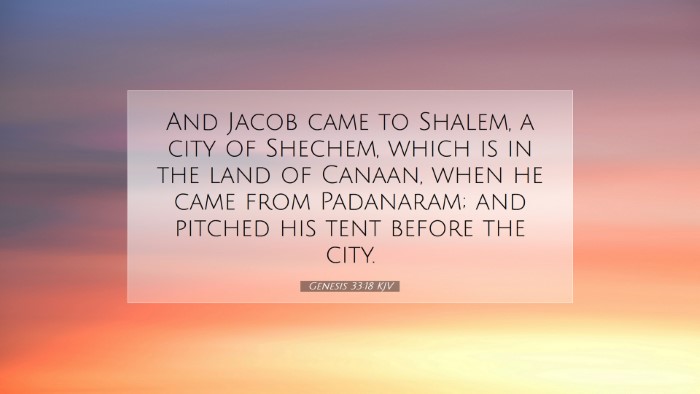Commentary on Genesis 33:18
Genesis 33:18 states, "And Jacob came to Shalem, a city of Shechem, which is in the land of Canaan, when he came from Padan-aram; and pitched his tent before the city." This verse marks a significant moment in the life of Jacob as he returns to the promised land after many years of exile. In the following commentary, insights and reflections from prominent public domain commentators, including Matthew Henry, Albert Barnes, and Adam Clarke, are synthesized to provide a deeper understanding of this critical passage.
Contextual Background
In the narrative leading to this verse, Jacob has just reconciled with his brother Esau after a long-standing conflict stemming from Jacob's deception (Genesis 27). This moment is pivotal not only for Jacob personally but also for the unfolding story of Israel as a nation.
Key Insights
1. Jacob's Journey and Settlement
Matthew Henry emphasizes that Jacob's arrival at Shalem signifies his transition from being a pilgrim to establishing a home. The name "Shalem" symbolizes peace, indicating that Jacob entered a phase of life marked by reconciliation and stability. This shift is crucial as it demonstrates God’s faithfulness to Jacob’s promises and the protective grace shown to him throughout his arduous journey.
2. Significance of Shechem
Albert Barnes notes that the location of Shechem carries profound historical and theological significance in Israel's history. Shechem would later serve as an important city during the conquest of Canaan and in the life of the Israelites. By settling here, Jacob establishes a legacy that intertwines with God’s ongoing covenant. The city’s association with blessings and curses in future texts echoes the significance of Jacob’s choice to dwell there.
3. Implications of “Pitched His Tent”
Adam Clarke highlights the phrase "pitched his tent" as indicative of both a literal and a metaphorical settling. It reflects Jacob’s intention to root himself in the land God promised to his forefathers. Clarke suggests that by pitching his tent, Jacob acknowledges divine providence and the security of God’s promises. This act is filled not just with physical implications but signifies Jacob's covenantal identity and relation to God’s promises.
Thematic Reflections
1. God’s Faithfulness
Throughout Jacob’s life, moments of conflict and resolve have been intimately tied to God’s promises. The journey from Padan-aram symbolizes not just a physical return but a reorientation toward the covenant (Genesis 28:15). The accounts in these chapters reveal a God who listens, guides, and facilitates the return of His people to their rightful place; a profound message for contemporary believers emphasizing the faithfulness of God to His word.
2. Reconciliation and Community
The reconciliation between Jacob and Esau is encapsulated in this journey home. As Jacob comes to Shalem, it reflects a broader theme of healing relationships. The movement of Jacob toward peace with Esau is a precursor for establishing harmonious communities—a theme every pastor and leader should heed today. In his return, Jacob offers theological insights into the importance of reconciliation in the life of God’s people.
3. Legacy and Influence
The choice of Shechem as a place of residence foreshadows the significance of this city in later biblical narratives, including the event of Joshua renewing the covenant with the Israelites (Joshua 24). Jacob’s actions here prompt considerations of personal and communal legacy—an inquiry into how individual decisions can shape the trajectory of future generations.
Conclusion
Genesis 33:18 is rich with meaning and implications for those who study the Scriptures. Jacob’s arrival in Shalem is more than a geographical reset; it is a pivotal moment where divine promise, human reconciliation, and communal identity converge. The insights from these esteemed commentators remind us that the journey of faith is filled with divine assurances, calls for reconciliation, and the establishment of legacies that impact communities. For pastors, students, and theologians, Jacob's story offers enduring lessons on faithfulness and the complexities of human relationships as part of God's unfolding purpose.


